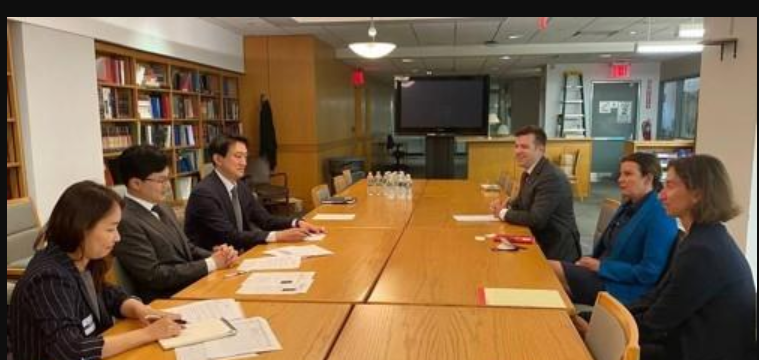South Korean justice minister Han Dong-hoon was in New York recently to discuss various ways in which the two nations can corporate on investigations associated with financial crimes, especially crypto-related crimes.
Hoon met with Securities and Commodities Task Force co-chief Andrea M. Griswold, at the U.S. Attorney’s Office for the Southern District of New York along with Scott Hartman, chief of the Securities and Commodities Fraud Task Force of the same office on Tuesday, reported a local daily.
The two sides discussed ways to exchange information and strengthen cooperation to ensure timely action on the increasing number of securities frauds associated with the digital asset market, reported a local daily. The two sides have reportedly agreed to share their latest investigation data around Terra-LUNA, a crypto project under investigation in both countries.
 Justice Minister Han Dong-hoo (left) meets with prosecution officials from the United States, Source: Yna
Justice Minister Han Dong-hoo (left) meets with prosecution officials from the United States, Source: Yna
The $40 billion Terra ecosystem crash has attracted legal scrutiny from both countries. The U.S has recently opened a new investigation against Terra co-founder Do Kwon, while the South Korean prosecutors are looking into several charges including fraud, market manipulation and tax evasion.
Related: Terra 2.0: A crypto project built on the ruins of $40 billion in investors’ money
The cooperation between the two nations could be the first of many as crypto-related crimes have become the focus of regulators in recent times. South Korea has emerged as one of the most strict nations when it comes to crypto regulations, ensuring strict know your customer (KYC) and anti-money laundering (AML) guidelines.
The Terra saga has also prompted Korean lawmakers to form a new crypto oversight committee to assess the new crypto projects listed on crypto exchanges. Many experts have predicted that the crash of Terra-USD (UST) would prompt regulators to favor centralized stablecoins over algorithmic ones.
Due to the lack of clear crypto regulations, tracking and prosecuting these crimes which often involve cross-border transactions and laundering, becomes increasingly difficult and complex. For example, a Dutch university paid 200,000 in Bitcoin (BTC) as a ransom in 2019, the investigators managed to track one wallet to Ukraine and eventually had to work with the local authorities to get back the funds nearly three years after the hack.


